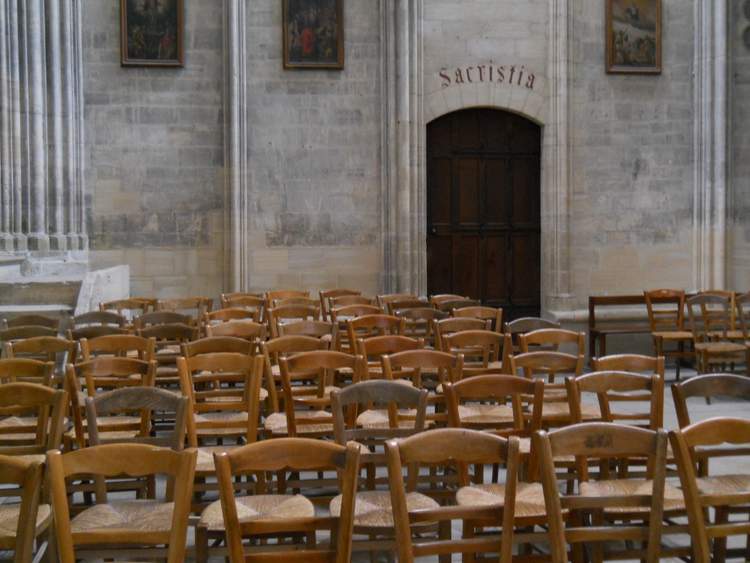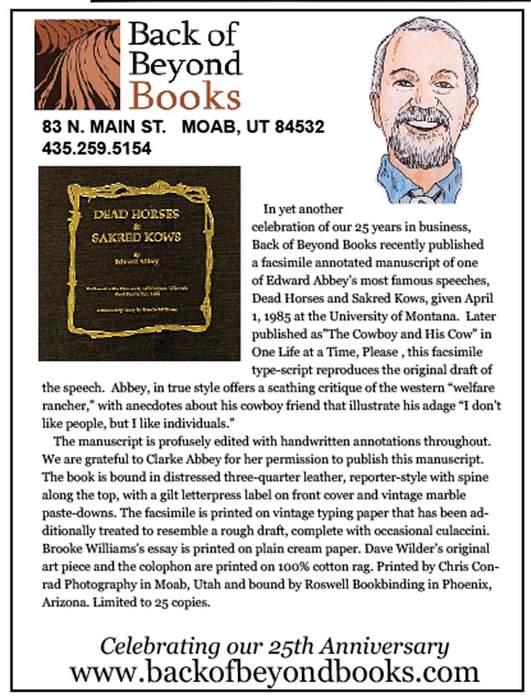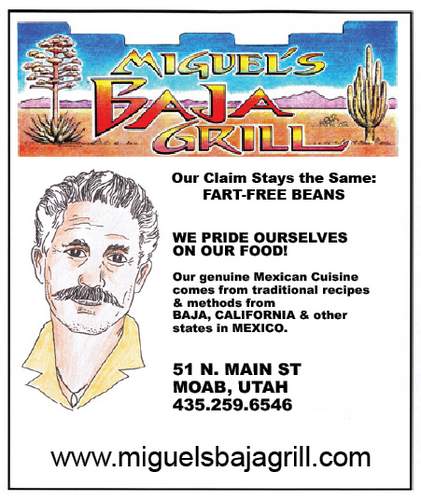There’s no use in sugar-coating it: I can’t go to church services anymore. When an acquaintance died a couple years ago—a warm, funny and open-minded man—I thought we were right to go to his funeral. I was raised Catholic, after all, and had attended various Protestant services over the years. The church where the funeral would be held was only Methodist, and not some frighteningly alien evangelical denomination. I still considered myself a Catholic, of a lapsed variety, and felt like a morning’s dose of religion could even be comforting, and a small price to pay to hear more about the man who had died and spend some time remembering him.
I shuffled into the church with my husband, Jim, and smiled a closed-lipped funeral smile at anyone who looked curiously at us, the strangers. We settled into a pew near the back, and I was feeling pretty positive about the whole thing—until they started talking.
The language got under my skin immediately. It wasn’t anybody’s fault, really. But I’d forgotten that there are so many words in Christianity that make me uncomfortable—foundational words, really, like “Christ” or “Scripture” or phrases like “Walking with the Lord” or “being Saved.” I’d heard those words come out of the mouths of the worst people I’d ever met—people who used those words while acting out cruelty and hypocrisy, and I couldn’t hear them anymore without my skin crawling. I kept myself pulled together. Everyone at this funeral was very nice, and I’d liked the man who died, and wanted to be a part of remembering him, but I couldn’t help feeling more and more alienated from the proceedings. This place wasn’t for me. In the end, I was grateful when the service ended and I could go home.
I know that many of the ex-Faithful can relate to my experience—running up against those unhealed injuries of your past experiences with the religious. In a country as Christian as ours, nearly everyone will have met someone who uses their faith like a cudgel to destroy other people, or like a facade to excuse their terrible acts. And it’s very tempting to turn those painful memories into a deep resentment of all the religious. To justify that anger as intellectual superiority, proof of your righteousness over the “nonsense” of religion.
A few years ago, Jim and I were in Europe, and we struck up a conversation over breakfast with a British couple who were staying at the same B&B. They were friendly and funny, and it was a relief to speak English after a few weeks spent exhausting the stores of our High School-level French. We shared amicable opinions of the people, the countryside, and traded anecdotes to poke fun at the differences between our home countries. And it probably won’t be a surprise to anyone familiar with those differences that the aspect of American culture they found most confounding was its religiosity.
“We’ve pretty well gotten rid of that,” they explained. “All that nonsense. It is too bad to see the pretty old churches falling down, but they’ve turned a lot of them into art galleries or apartments or community halls, so that’s nice.”
“So no one is religious anymore?” I asked.
“Oh, quite a few of the old people, I guess. And the immigrants, of course, but they have their own fairy tales.”
“That’s too bad.”
“Oh, they’ll probably get less religious too, with time,” they answered, misunderstanding my response. “It’s only natural.”
And, once again, I found myself caught outside the conversation. I’d admitted to them that I wasn’t particularly religious, myself, but here I was, inexpressibly depressed at the thought of a future in which everyone “naturally” lost their faith. And found what in its place? Science, I suppose.

I don’t want to leap immediately from noticing that people around the world are abandoning religion to claiming a victory for Atheists. A lack of religion and Atheism are not the same thing. And while the non-religious are growing in astronomical numbers around the developed world, Atheists are a minority in every country, and a particularly small minority here in the USA. But one tenet of Atheism that I do believe is winning minds in every country is the belief in the unerring superiority of Science over other ways of understanding.
Science has won the war of definitions. To “prove” something now means to prove it through the scientific method. For something to be “true” is must be observable, physically, to the human eye. There must be physical evidence. And the assumption that lies under modern life is that your physical observations are not only trustworthy, but are far more trustworthy than your emotions, your reasoning, the stories you were told by your family, or anything that lives solely within your mind.
If this weren’t the case, then fundamentalist Christians wouldn’t be so terrified of sending their children to college. They, like Atheists, have been teaching them that physical truth is the only truth, and that their Religion, best explained on a Metaphysical level, is physically true. So, of course, if you’ve been told all your life that the Virgin Birth is true in the same way that electrical currents and chemical reactions are true, then one afternoon in a Biology classroom can and will shake your beliefs. And a literal belief in the Transubstantiation of bread into God’s body or the 7-Day Creation of the World can falter after even one semester of scientific study.
And so, by and large, the very religious concede that “intellectuals” and “higher education” are in opposition to their religion. And they try to keep themselves and their families away from the challenging opinions of others. Despite thousands of years of religious intellectualism and religious scientists, the Atheists and the Christians will agree on one thing: Science and Religion are enemies. If one is true, then the other must be false.
Nobody seems willing to entertain the other logical conclusion: that the two branches of knowledge are dealing with separate matters. That the physical realm can be best observed through Science. And that there is an equally valid and important field, Metaphysics, which is necessary for examining Morality and Mythology.

Do you love your mother? How could you prove it, by the scientific method? Only shallowly. Patterns of behavior. Repeated stated declarations. But we know that a person can hug and kiss, and make weekly phone calls, and say “I love you” and still be a liar.
And what is the part of you that loves her? Obviously, it is not your “heart,” the physical organ, pumping blood through physical arteries and physical veins. Is it your brain that loves her? Some firing of neurotransmitters, stimulating hormone production, which elicits feelings of kinship and nurturing care? It could be.
But what is the value of such a love, which could be destroyed with a minor re-wiring?
The very worst of the Religious and of the Non-Religious alike are those who leave no room for doubt, and so I have to admit that it may be true that the “soul” is just a sum-total of chemical impulses. That all our chatter back and forth about love and betrayal, friendship, neglect, and pain, is nothing more meaningful than static over the radio. But if that is so, why talk about love at all? A person controlled solely through wiring and chemicals is nothing more than a machine. Can one machine love another machine? Can we frame our society around a belief in the dignity of each machine’s life, each machine’s right to happiness and opportunity? How is that dignity conferred? Does the Refrigerator mind that he is a slave?
 I have read purely scientific cases for morality. Usually based around evolutionary biology, they argue that ethics and altruism survive because they are beneficial traits for the survival of a community. That empathy was an evolutionary advantage, because an emotionally bonded tribe was more likely to survive the harsh realities of prehistoric life. And that, despite our modern comforts, those traits are still valuable for the same reasons.
I have read purely scientific cases for morality. Usually based around evolutionary biology, they argue that ethics and altruism survive because they are beneficial traits for the survival of a community. That empathy was an evolutionary advantage, because an emotionally bonded tribe was more likely to survive the harsh realities of prehistoric life. And that, despite our modern comforts, those traits are still valuable for the same reasons.
That’s lucky for us, I suppose, that empathy primed us for our continued existence. But, I always wonder, what if the data had gone the other way? There’s nothing to stop the scientists of the future from discovering errors in those studies, and concluding that empathy, altruism and ethics are damaging, or just incidental, to the survival of the species. That there is no scientific case for encouraging such emotions. This is the nature of scientific thought, to continually discover errors in the existing data, or extenuating factors that fundamentally alter what we know about our world. So it isn’t implausible that we will one day believe that morality serves no evolutionary function at all.
And, if such a thing were true, could we still make a case for love? How could we, if the physical world is all we have? If metaphysics is nothing but nonsense? Hopefully, we would go on loving, and betraying that love, arguing for the rights of the downtrodden, and helping our neighbors, even with no explanation for why we are doing such things. But how shallow that world would be, with no philosophy to support us.
Every religion could be wrong, all the mythology could be lies, and there could still be a God. Or Gods. Or some sort of shaping force that guides the motions of the Universe. Whether we believe in miracles or not says nothing of whether they happen. There may not be miracles, or any supernatural happenings— or there may be infinite miracles, but none that reach the shallow spectrum of perception that we call “reality.” All our dreams and fairy tales could be visions of life transmitted from the dimension next door. The mind may contain, and create, the whole universe. And science, based as it is on what we can see and document physically, would have no case to confirm or refute.
But I understand that, in order to live, we must operate as though some things are true and others are false. It’s easy to relegate the realities beyond our perception to the back of the mind. After all, how can we go on doing anything if we don’t assume that we have the tools to distinguish truth from falsehood? But the scientific method is only one tool. It’s an important tool, yes, (the hammer, to which all situations present a nail,) but we shouldn’t limit our abilities for discernment to the functions of that one tool.
Classifying a religion as Mythology shouldn’t be an insult. Mythology has played an essential role in human history. It tells us what we believe about ourselves, and our place in the universe. It has shaped morality—for better and for worse—and it contains the best thinking we have on what “humanity” means. After all, we live our lives as more than a series of physical reactions, played out on a physical field. We experience rapture, and grief, and revelation. And, if there’s any chance that life is more than “physical,” then we need intellectuals who don’t scoff at Mythology and Metaphysics. We need Atheists, too, and religious scientists; we need some, religious or otherwise, who are skeptical of Science; and we need the non-religious who haven’t lost their reverence for the Mystery. In short, we need respect. Respect for science, and respect for religion and metaphysics, if we’re going to preserve the materials of our humanity.
Tonya Stiles is Co-Publisher of the Canyon Country Zephyr.
To read the PDF version of this article, click here.
To comment, scroll to the bottom of the page.
Don’t forget the Zephyr ads! All links are hot!









I am spiritual but not religious. I attempt to follow Christ’s teachings. I respect the choices of all people.
Could it be that to the extent that the various religions teach love and compassion, and to the extent their believers practice the same, they are in fact true? And that to the extent they’re dogmatic and/or frequented by controlling, hypocritical, even abusive people, they’re full of crap? Could it also be that while science is splendid in its growing understanding of the brain, that the brain and the mind are not actually the same, even though they’re related? And that the mind is, as you may have suggested, as vast as the universe itself and beyond time and space?
Just wondering.